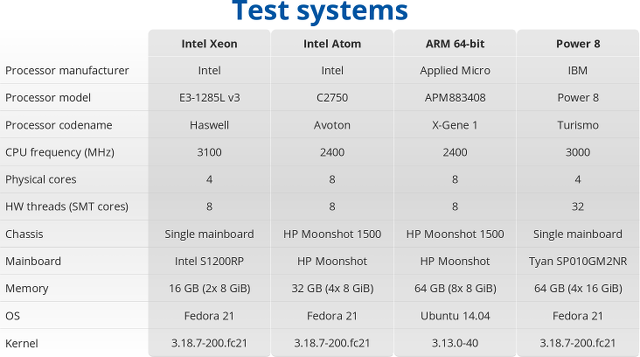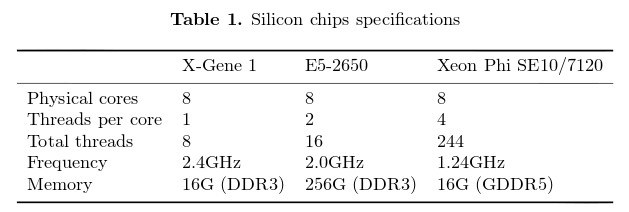Last year, the CERN published a paper comparing Applied Micro X-Gene (64-bit ARM) vs Intel Xeon (64-bit x86) Performance and Power Usage, and they’ve now added IBM Power 8 and Intel Atom Avoton C2750 processor to the mix in a new presentation entitled “A look beyond x86: OpenPOWER & AArch64“. So four systems based on Intel Xeon E3-1285L, Intel Atom C2750, Applied Micro X-Gene 1, and IBM Power 8 were compared, all running Fedora 21, except the HP Moonshot 1500 ARM plarform running Ubuntu 14.04 and an older kernel. All four systems use gcc 4.9.2, and Racktivity intelligent PDUs were used for power measurement. I’ll just share some of their results, you can read the presentation, or go through the benchmark results to find out more. HEP-SPEC06 is a new High Energy Physics (HEP) benchmark for measuring CPU performance developed by the HEPiX Benchmarking Working Group, and here it’s not […]
Applied Micro X-Gene (64-bit ARM) vs Intel Xeon (64-bit x86) Performance and Power Usage
A group of researcher at CERN have evaluated Applied Micro X-Gene 1 64-bit ARM XC-1 development board against Intel Xeon E5-2650 and Xeon Phi SE10/7120 systems, and one of them, David Abdurachmanov, presented their findings at ACAT’ 14 conference (Advanced Computing and Analysis Techniques) by listing some of the issues they had to port their software to 64-bit ARM, and performance efficiency of the three systems for data processing of High Energy Physics (HEP) experiments like those at the Large Hadron Collider (LHC), where performance-per-watt is important, as computing systems may scale to several hundred thousands cores. Intel Xeon Phi platform based on Many Integrated Cores (MIC) computer architecture was launched the HPC market, and contrary to the table above features 61 physical cores. Applied X-Gene 1 (40nm process) was used instead of X-Gene 2 built on 28-nm process which was not available at the time. The ARM platform ran […]




